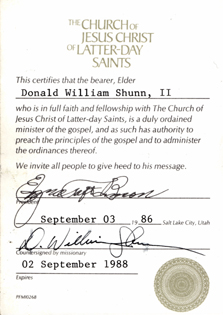As I said last time, Snow and I had numerous adventures in our two and a half short months together, most of which once made for great telling at
mission reunions. There was the Mattress on Top of the Car, the Evening of Two Hearty Dinners, the Week We Lost Our Wheels, the Great Chinese Fire Drill Prank, and even the Unexpected Fart During Prayers (which I have sworn a solemn oath never to relate). These are all entertaining stories in their own rights, but none hold a candle to our current narrative, as you'll see if you stay with me.
Snow and I had so much fun together (though I can't pretend that I wasn't still suffering from a trunkiness that was only tenuously held at bay) that it seems impossible in retrospect for it all to have happened in just two and a half months. Overall, though, the first six months of my mission seemed to take years to drag by, so maybe it's not so strange that my time with Snow seems to have lasted so long. (Conversely, the last six months fairly flew by. I think it's a function of the ratio of time passed to time remaining.)
Snow was the district leader in our little corner of southeast Calgary, and there were four other missionaries in our district besides the two of us. Elder Van Wagoner (an off-putting name until you realize that it's German for bear foot) and his companion Elder Bishop had the area just south of ours. Sisters Roper and Steed worked in the neighborhood east of us. Snow and I ended up spending the bulk of our spare time with Roper and Steed.
Monica Roper was about twenty-two and quite attractive, and if her manner hadn't intimidated me so much I would probably have had a big crush on her. She came from Amarillo, Texas, and she had a way of acting as if she were the captain of whatever enterprise was at hand. She was very outspoken, and she was forever questioning me about why I had come on a mission. I was usually uncomfortable around her, because her questioning seemed to indicate that she knew I had tried to run away (a fact that President Tuttle had labored to keep under wraps as much as possible, so that I wouldn't have to endure a lot of humiliating innuendo from other missionaries). It turned out later that Roper's questions were the result of nothing more than simple curiosity—that's the way she was—and my paranoia the result of, well, simple paranoia.
Full entry


